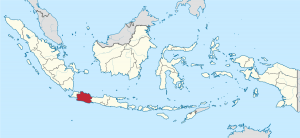Source: www.morningstarnews.org
Date: April 6, 2023
Muslim intruders demanded congregation stop worshiping at site.
By Our Indonesia Correspondent

Location of West Java Province, Indonesia. (TUBS, Creative Commons)
SURABAYA, Indonesia (Morning Star News) – Local officials sealed shut a church building in West Java Province, Indonesia on Saturday (April 1), two weeks after Muslims intruded into a worship service and demanded its closure, church leaders said.
The congregation of the Simalungun Christian Protestant Church (Gereja Kristen Protestan Simalungun, or GKPS) in Cigelam, Babakancikao, Purwakerta, about 60 miles southeast of Jakarta, had refused to bow to demands to stop worship during the March 19 confrontation.
Purwakerta Regent Anne Ratna Mustika sealed the church building along with the local leader of the Indonesia Ulema Council (Majelis Ulama Indonesia, or MUI), the heads of the local police and the military, the local religion department chief and the chairman of the area National and Political Unity, according to video footage.
Anne said the structure was illegal as it lacked approval and a certificate of proper function – almost impossible to obtain in Indonesia – but the head of Purwakerta GKPS Elders Council, Krisdian Saragih, said the building was closed without due process of law.
“The sealing should be made on the court verdict as proof that the local government is enforcing the law,” Krisdian told Morning Star News.
The closing of the church building a week before Easter came without prior notification, he said.
“It was a saddening event for us, all the congregation, because it took place right before Easter Holy Week,” he told Morning Star News. “The church sealing is also unfair because it was made without prior official notice to us as the building owner. It was made in our absence; no congregation member or church elders were present.”
Krisdian and Pastor Julles Purba said that instead of closing the church building, officials should have detailed requirements to obtain a building permit, which involves obtaining approval from surrounding residents.
“The government should tell us what requirements we should fulfill; we are of course willing to deal with the locals around our church,” Krisdian said. “We want to be part of the local community. We really want to know what they expect from us.”
The church had never had any conflict with area residents until the disruption of the church service on March 19, he said.
Requirements for obtaining permission to build houses of worship in Indonesia are onerous and hamper the establishment of such buildings for Christians and other faiths, rights advocates say. Indonesia’s Joint Ministerial Decree of 2006 (SKB) makes requirements for obtaining permits nearly impossible for most new churches.
Even when small, new churches are able to meet the requirement of obtaining 90 signatures of approval from congregation members and 60 from area households of different religions, they are often met with delays or lack of response from officials. Well-organized radical Muslims secretly mobilize outside people to intimidate and pressure members of minority faiths.
Anne reportedly said the sealing was temporary until the church obtains all permits.
“We are grateful that the steps to sealing the building could be taken in the spirit of togetherness to maintain a conducive atmosphere in Purwakarta – all parties involved are being very wise,” she said, according to CNNIndonesia.com.
Anne said that she and the local religion department made arrangements with 19 nearby churches to allow the GKPS congregation to use their buildings for worship services, according to Kompas.com.
“We will help coordinate, allowing them to hold their worship service in those churches,” she said. “Their rights as citizens to hold worship services according to their religion remain protected and maintained; it is according to the constitutional mandate.”
To forestall festering social unrest, Anne said the decision to close the church building arose from an agreement among the Purwakarta Regency Government Coordination Meeting, the Regional Leadership Coordination Forum, the Indonesian Ulema Council (MUI), the Office of the local Religion Department, the Forum for Religious Harmony (FKUB), the Purwakarta Cooperation of Churches Agency (BKSG) and, she claimed, representatives of the GKPS congregation.
Discrimination
In reality, GKPS representatives said they were not involved and later reacted strongly against the closure, and the Communion of Indonesia Christian Churches (Persatuan Gereja Indonesia, or PGI) submitted a letter of protest to Anne, the Purwakerta regent.
Signed by the chairman of the PGI Justice and Peace Body, Henrek Lokra, the letter states that the sealing of the church was an act of discrimination that does not reflect tolerance among religious communities.
“The absence of the church building permit as the reason for the sealing of the church building was an excuse made up by the regent,” the PGI letter states.
